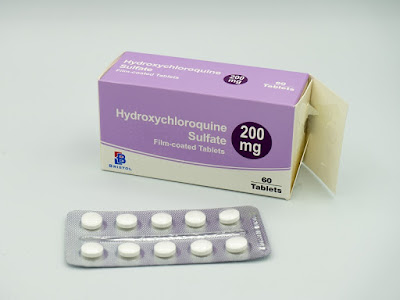CORONAVIRUS PANDEMIC UPDATE: STUDY FOUND HYDROXYCHLOROQUINE NO BETTER THAN STANDARD CORONAVIRUS CARE
Hydroxychloroquine, an antimalarial drug dubbed a "gift from God" by Donald Trump for its potential ability to fight the new coronavirus, was found to be no more effective than standard treatment in a small Chinese study.
The report published by the Journal of Zhejiang University in China on March 6, showed that patients who got the medicine didn’t fight off the new coronavirus more often than those who did not get the medicine.
The study involved just 30 patients. Of the 15 patients given the hydroxychloroquine, 13 tested negative for the coronavirus after a week of treatment. Of the 15 patients who didn’t get hydroxychloroquine, 14 tested negative for the virus.
The results of the study weren’t statistically significant.
Name of Study: A pilot study of hydroxychloroquine in treatment of patients with common coronavirus disease-19 (COVID-19)
Authors: CHEN Jun, LIU Danping, LIU Li, LIU Ping, XU Qingnian, XIA Lu, LING Yun, HUANG Dan, SONG Shuli, ZHANG Dandan, QIAN Zhiping, LI Tao, SHEN Yinzhong, LU Hongzhou (Department of Infection and Immunity, Shanghai Public Health Clinical Center, Fudan University, Shanghai 201508, China)
Objective: To evaluate the efficacy and safety of hydroxychloroquine (HCQ) in the treatment of patients with common coronavirus disease-19 (COVID-19).
Methods: We prospectively enrolled 30 treatment-naïve patients with confirmed COVID-19 after informed consent at Shanghai Public Health Clinical Center. The patients were randomized 1:1 to HCQ group and the control group. Patients in HCQ group were given HCQ 400 mg per day for 5 days plus conventional treatments, while those in the control group were given conventional treatment only. The primary endpoint was negative conversion rate of COVID-19 nucleic acid in respiratory pharyngeal swab on days 7 after randomization. This study has been approved by the ethics committee of Shanghai public health clinical center and registered online (NCT04261517).
Results: One patient in HCQ group developed to severe during the treatment. On day 7, COVID-19 nucleic acid of throat swabs was negative in 13 (86.7%) cases in the HCQ group and 14 (93.3%) cases in the control group (P>0.05). The median duration from hospitalization to virus nucleic acid negative conservation was 4 (1-9) days in HCQ group, which is comparable to that in the control group [2 (1-4) days, (U = 83.5, P > 0.05)]. The median time for body temperature normalization in HCQ group was 1 (0-2) after hospitalization, which was also comparable to that in the control group 1 (0-3). Radiological progression was shown on CT images in 5 cases (33.3%) of the HCQ group and 7 cases (46.7%) of the control group, and all patients showed improvement in follow-up examination. Four cases (26.7%) of the HCQ group and 3 cases (20%) of the control group had transient diarrhea and abnormal liver function (P> 0.05).
Conclusions: The prognosis of common COVID-19 patients is good. Larger sample size study is needed to investigate the effects of HCQ in the treatment of COVID-19. Subsequent research should determine better endpoint and fully consider the feasibility of experiments such as sample size



Comments
Post a Comment